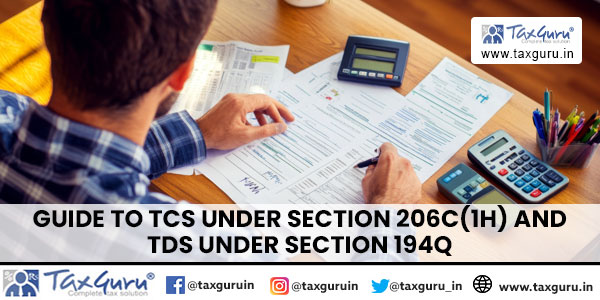In recent years, India’s tax system has introduced various measures to enhance tax compliance and prevent tax evasion. Among these, Tax Collected at Source (TCS) under Section 206C(1H) and Tax Deducted at Source (TDS) under Section 194Q have become crucial provisions for businesses. These provisions primarily target businesses with significant turnover and large transactions between buyers and sellers. Here’s a breakdown of the key features of TCS and TDS under these sections, and what businesses need to know to stay compliant.
What Are TCS and TDS?
TCS and TDS are mechanisms designed to collect and deduct tax at the point of transaction, ensuring tax compliance from both the buyer and seller.
TCS under Section 206C(1H) applies to sellers engaged in the sale of goods. This provision becomes applicable when the total consideration from a single buyer exceeds Rs. 50 lakh during a financial year. The seller is required to collect tax at the time of receiving the payment.
TDS under Section 194Q is applicable to buyers who purchase goods worth over Rs. 50 lakh in a financial year from a single seller. The buyer, in this case, is responsible for deducting tax at the time of payment or crediting the amount to the seller’s account.

Both TCS and TDS apply only to businesses with a turnover exceeding Rs. 10 Crore in the preceding financial year.
Key Features of TCS under Section 206C(1H)
TCS applies to sellers involved in the sale of goods, provided their turnover in the previous year exceeds Rs. 10 Crore. However, there are some important exceptions to be aware of:
- Exclusions: Goods that are exported, or those falling under other specific provisions (e.g., alcohol for human consumption, tendu leaves, timber) are not covered under TCS.
- Timing of Collection: The tax must be collected at the time of receiving payment from the buyer, not at the time of the sale.
- GST Inclusion: TCS is calculated on the total payment received, including any Goods and Services Tax (GST) charged on the transaction.
The seller must collect TCS at a rate of 0.1% on the consideration received from the buyer. If the buyer fails to provide a PAN, the rate increases to 1%.
Key Features of TDS under Section 194Q
TDS under Section 194Q is designed to be applicable to buyers who purchase goods from sellers whose turnover exceeds Rs. 10 Crore. The buyer is required to deduct tax at the time of payment or when the amount is credited to the seller’s account—whichever happens first.
- Exclusions: TDS does not apply to the GST portion of the purchase invoice.
- Tax Rates: The standard rate for TDS is also 0.1% of the purchase amount. However, if the buyer does not provide a PAN, the rate increases to 5%.
When Are TCS and TDS Not Applicable?
While TCS and TDS are important compliance tools, there are instances where these provisions do not apply or where one may override the other:
- Overlap of TCS and TDS: If TDS has already been deducted under Section 194Q, TCS under Section 206C(1H) will not apply to the same transaction. Similarly, if TCS has been collected under provisions other than Section 206C(1H), TDS will not apply.
- Double Taxation Concerns: If a transaction falls under both Section 194Q and Section 206C(1H), the tax must be deducted under Section 194Q, which will take precedence, and the transaction will be excluded from the purview of Section 206C(1H). In situations where TCS is collected before TDS is deducted, the buyer is not required to deduct tax again.
These cross-application rules are in place to avoid confusion and prevent multiple deductions on the same transaction.
Timing and Due Date for Collection and Deduction
Both TCS and TDS must be deposited with the government by the 7th of the following month. The only exception is for transactions occurring in the month of March, for which the due date is extended to 30th April. It’s crucial for businesses to ensure timely deposit to avoid penalties for late payment.
- TCS Collection: TCS is collected when the payment for goods is received.
- TDS Deduction: TDS must be deducted when the payment is made or when the amount is credited to the seller’s account.
Compliance and Certificates
After collecting or deducting the tax, businesses are required to file returns and issue certificates to ensure compliance:
- TCS Certificate: The seller must file a quarterly return in Form 27EQ and issue a TCS certificate (Form 27D) to the buyer, showing the amount collected and deposited with the government.
- TDS Certificate: Similarly, the buyer must file a quarterly return in Form 26Q and issue a TDS certificate (Form 16A) to the seller, showing the tax deducted and deposited.
These certificates provide proof of tax payment and are crucial for both parties when filing their income tax returns.
******
Disclaimer: The information provided in this article is intended for general informational purposes only. It is not intended to serve as professional tax advice. For specific tax guidance or clarification regarding TCS and TDS, businesses should consult a qualified tax professional or refer to the latest notifications from the Income Tax Department. Tax laws are subject to amendments, and it is important to stay updated with any changes that may impact tax obligations.




